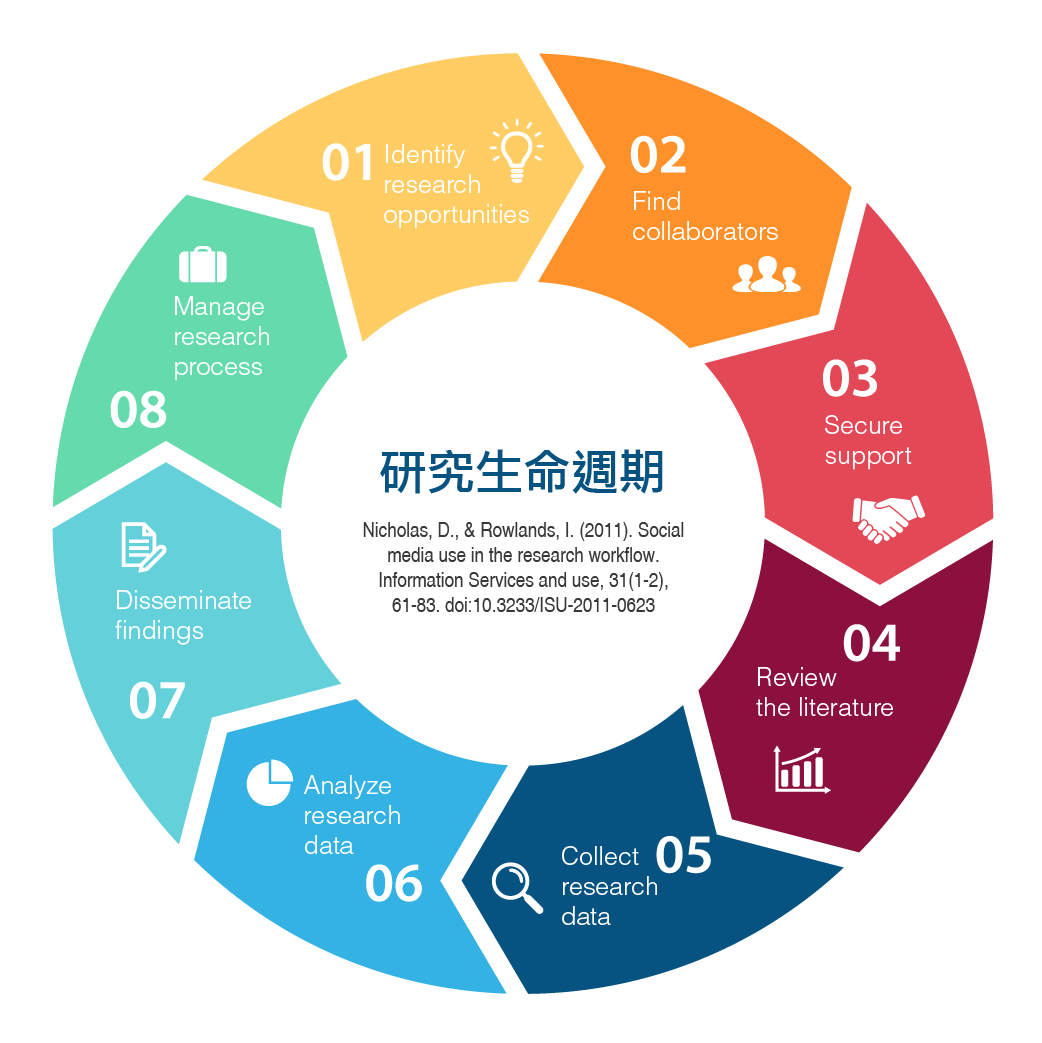We list out resources and services offered by NTHU library and other university departments that aids researchers in the different phases of the research lifecycle.

Identify research opportunities
How to identify the research topic?
You can explore individual interests and research fields by keywords searching or word cloud to find the relevant teachers, courses or published research.
Resources and services:
- E-learning System
- OpenCourseWare
- MOOCs
- Division of Curriculum
- NTHU library
Find collaborators
How to find collaborators?
Visit college and department websites, journal websites, or citation databases to search for possible collaborators / peers related to certain research interests and fields.
Resources and services:
- Knowledge Hub
- College & department websites
- Citation databases: Web of Science, Scopus, PubMed, Ei Compendex
- Taiwan Citation Index - Humanities and Social Sciences (TCI)
Secure support
How to find reliable funding support?
You can find suitable projects or subsidies that you are qualified to apply for. The related information can use following websites.
Resources and services:
Review the literature
Literature review is an important phase of conducting a research project. After identifying the research topic, researchers begin to work on figuring out the answers to certain questions. In other words, researchers should propose a statement that explain the questions, and find strategies to answer the questions.
How to search and access related literature?
You can use citation databases and services offered by the library to search for literature related to your research topic. Full text access can then be acquired on full-text databases or journal websites.
Resources and services:
- NTHU library
- Research guide
- NTHU Library Discovery System
- Citation databases: Web of Science, Scopus, PubMed, Ei Compendex
- Taiwan Citation Index - Humanities and Social Sciences (TCI)
- Google Scholar
How to manage related literature effectively?
You can use reference management software to manage related literature.
Resources and tools:
- Reference management software
Collect research data
After identifying the research questions and creating research design, researchers need to collect research data. Data collection is a process of gathering relevant information in order to put theory into practice. Based on the data sources, research data can be classified into survey data, interview data, observation data, literature, and trace data.
How to collect research data?
Depending on the research method, you should choose suitable tools to collect research data.
- Online survey tools: Google Forms, SurveyCake, SurveyMonkey
- Note software: Evernote, OneNote
- Online transcription tools: oTranscribe, Speechnotes
Analyze research data
After data collection, analysis is required in order to obtain answers to the research questions, that is the research results.
How to analyze research data?
Depending on the research questions and research data, you should choose suitable data analysis tools to analyze data so the outcomes could answer the research questions.
Resources and tools:
- Statistical software: Excel, R, SAS, SPSS, Stata, SPC Analysis
- Qualitative data analysis software: NVivo, MAXQDA
- Data visualization software: Tableau, Power BI, VOSviewer, Gephi
Disseminate findings
How to present research results in paragraph?
You can participate in the workshops offered by Center for Language Education to sharpen your writing skills. Visiting the journal websites to follow the guide of writing format, academic ethics, and intellectual property could be helpful as well. Meanwhile, you must avoid predatory journals and conferences.
Resources and services:
- Center for Language Education
- Referencing styles: APA, MLA, Chicago, IEEE, AMA
- Research Ethics Committee
- Copyright & Intellectual property
- Plagiarism checker - Turnitin
- Predatory journal & publishing
- Predatory journal evaluation tools
- Journal selection tools
- Journal Citation Reports (JCR): includes journals in the SCI, SSCI, A&HCI, and ESCI
- Directory of Open Access Journals (DOAJ): includes open access journals
- Master Journal List: includes journals in Web of Science
- MedSci
- Taiwan Citation Index - Humanities and Social Sciences (TCI)
- Journals Online: includes the Journal Online platforms from Africa, Philippines, Vietnam, Bangladesh, Central America, Mongolia, Nepal, and Sri Lanka
- Journal selection tools from publishers
Manage research process
How to manage and evaluate research results effectively?
You can use author identifier or academic social network platforms to manage and share research results. Research evaluation tools such as citation databases can be utilized to evaluate research outputs. Also, open technology transfer provides opportunities for industrial collaborations.
Resources and services:
- Author identifier
- ORCID
- Research ID (Web of Science), Scopus Author ID, Google Scholar profile
- Academic social network platforms: ResearchGate, Publons, Google Scholar
- ResearchGate、Publons、Google Scholar
- Knowledge Hub
- Research evaluation tools
- Web of Science, Scopus, InCites, ESI, SciVal
- Technology transfer application
 NTHU
NTHU